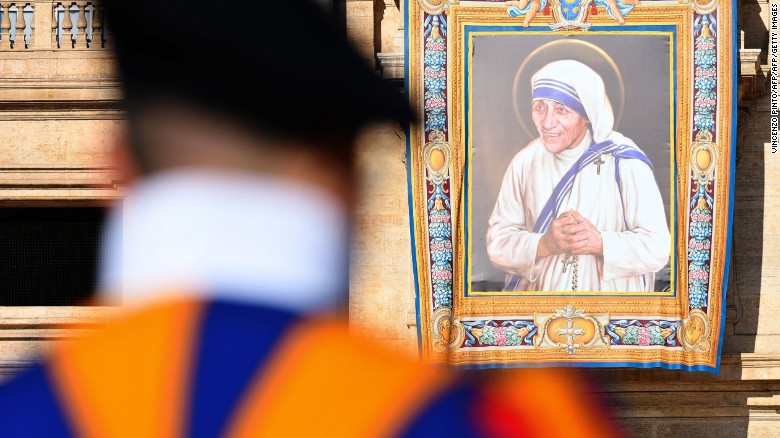Mother Teresa, a Catholic nun who devoted her life to help the poor and needy, revered in India, has been declared a saint in a canonization Mass held by Pope Francis in the Vatican.
Pope Francis delivered the formula for the canonization of the Albanian-born nun — known as the “saint of the gutters” — before huge crowds of pilgrims gathered in St. Peter’s Square in Vatican City on Sunday morning.
Francis said St Teresa had defended the unborn, sick and abandoned, and had shamed world leaders for the “crimes of poverty they themselves created” in the canonization ceremony where he declared “Blessed Teresa of Calcutta to be a saint.”
Speaking in Latin, Francis said that “after due deliberation and frequent prayer for divine assistance, and having sought the counsel of many of our brother bishops, we declare and define Blessed Teresa of Calcutta to be a saint, and we enroll her among the saints, decreeing that she is to be venerated as such by the whole church.”
The Pope said Mother Teresa had spent her life “bowing down before those who were spent, left to die on the side of the road, seeing in them their God-given dignity”.
He added: “She made her voice heard before the powers of the world, so that they might recognise their guilt for the crimes of poverty they themselves created.” He then repeated: “The crimes of poverty they themselves created.”
Two apparent cures of sick people after Mother Teresa’s death in 1997 have been attributed to her intercession.
Catholics — including hundreds of blue- and white-robed nuns from the Missionaries of Charity sisterhood founded by Mother Teresa — had gathered from around the world to attend the canonization of the church’s newest saint, just 19 years after her death.
A huge portrait of Mother Teresa, whom the church credits with having performed two miraculous cures of the sick, hung from St. Peter’s Basilica during the colorful ceremony.
In India, a special Mass was celebrated at the Missionaries of Charity, the order she founded in Kolkata (Calcutta).
Pope Francis then delivered a homily, in which he praised Mother Teresa — “this emblematic figure of womanhood and of consecrated life” — for her charitable work.
“Mother Teresa, in all aspects of her life, was a generous dispenser of divine mercy, making herself available for everyone through her welcome and defense of human life, those unborn and those abandoned and discarded,” he said.
“She bowed down before those who were spent, left to die on the side of the road, seeing in them their God-given dignity. She made her voice heard before the powers of this world, so that they might recognize their guilt for the crime of poverty they created.”
For the newly-sainted Teresa, he said, “mercy was the salt which gave flavor to her work, it was the light which shone in the darkness of the many who no longer had tears to shed for their poverty and suffering.”
She was an example to volunteers around the world, he said. “May she be your model of holiness.”
In a departure from his scripted remarks, he noted that people “may struggle” to refer to her as “Saint Teresa.”
“With great spontaneity, I think we will continue to call her Mother Teresa,” he said.
Prayers were then delivered in a number of languages, including Albanian, Mother Teresa’s native tongue, and Bengali, the language of Kolkata, where a special Mass was celebrated at the Missionaries of Charity Sunday. A prayer was delivered in Chinese for persecuted Christians around the world.
About 1,500 homeless people from across Italy were bused into the Vatican to be given seats of honor at the Mass — and be served a pizza lunch by nuns afterward.
